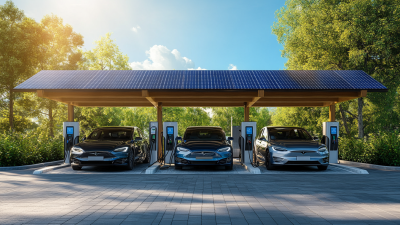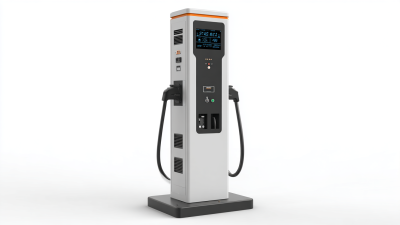In recent years, the electric vehicle (EV) market has seen exponential growth, driving the demand for reliable and efficient EV charging equipment. As consumers increasingly shift towards sustainable transportation, the role of EV charging equipment manufacturers has become critical in facilitating this transition. This blog post aims to evaluate the top EV charging equipment manufacturers by analyzing key metrics that define their performance in the industry. From technological innovation to production capacity and customer satisfaction, we will delve into the factors that set these manufacturers apart in a competitive landscape.

By providing industry insights and benchmarking their offerings, we hope to equip readers with the knowledge necessary to understand the present and future of EV charging infrastructure. Join us as we explore the dynamics of the EV charging equipment market and highlight the leading players shaping its evolution.
The electric vehicle (EV) charging equipment market is witnessing remarkable growth driven by various factors, including rising fuel prices and increasing environmental awareness. The establishment of EV charging infrastructure, particularly in emerging markets like India, marks a pivotal step in the EV revolution. As the demand for electric vehicles surges, the setup cost for charging stations is expected to be a significant consideration for new entrants in the market. Understanding the economic landscape and requirements to start an EV charging station will be essential for stakeholders looking to capitalize on this growth.
One key trend shaping the market is the rise of EV Charging as a Service (EV CaaS), which offers a flexible solution for businesses and individuals aiming to invest in charging infrastructure without heavy upfront costs. By adopting such models, they can streamline their investments and benefit from continuous advancements in technology.
**Tips:** When considering entry into the EV charging market, focus on securing necessary permits and assessing local demand. Additionally, investing in charging management software can optimize operations and improve user experiences, enhancing the overall viability of the charging station. Moreover, monitoring government policies can help in strategizing for potential financial incentives and grants that could support infrastructure development.
When evaluating electric vehicle (EV) charging equipment manufacturers, several key metrics emerge as critical indicators of performance and capability. These metrics include the efficiency of charging stations, compatibility with various EV models, and the speed of charging processes. Furthermore, manufacturers' commitment to sustainability and innovation in technology, such as incorporating machine learning for energy consumption prediction, plays a significant role in determining their market viability.

Recent legislative developments, like the Massachusetts Clean Energy Bill, emphasize the growing importance of robust charging infrastructure in promoting EV adoption. Monitoring and optimizing charging efficiency not only enhances user experience but also supports broader environmental goals. As states like Maryland implement inspection programs for public charging stations, it becomes essential for manufacturers to meet regulatory standards while ensuring that their products contribute to an interconnected and sustainable energy grid.
Thus, a comprehensive evaluation of these key metrics is vital for stakeholders looking to invest in or support the expansion of the EV charging ecosystem.
The evolution of electric vehicle (EV) charging technologies is pivotal as the industry scales up to meet the demands of a burgeoning EV market.
A comparative analysis of leading EV charging station technologies highlights significant advancements and diverse approaches to optimizing charging efficiency and sustainability.
With the rising significance of ultra-fast charging, innovations in charging infrastructure are essential to mitigate impacts on power grids and enhance user experience. The adoption of dynamics charging solutions, also known as charge-on-the-move systems, showcases a transformative leap, allowing vehicles to charge while in motion, which may prove crucial for urban mobility and reducing charging downtime.
Moreover, the market for EV charging infrastructure is projected to grow substantially, with the GCC region alone expected to increase from USD 2.04 billion to USD 5.58 billion by 2030.
These insights emphasize the necessity of a robust and versatile charging ecosystem that integrates renewable energy sources. Additionally, as the technology evolves, a comparative analysis of cost-effective charging options must be prioritized to facilitate widespread EV adoption.
The interplay of advanced technologies, regulatory frameworks, and strategic policies will pave the way for a more sustainable and efficient EV future.
As the electric vehicle (EV) market continues to grow, several key trends are shaping the future of electric vehicle charging solutions. One of the most significant trends is the advancement of fast-charging technology, which aims to reduce the time it takes to recharge an EV significantly. Manufacturers are now focusing on high-power charging stations that can provide substantial mileage in just a few minutes. This not only enhances the user experience but also addresses one of the major concerns potential EV buyers have: range anxiety.
Additionally, the integration of smart technology in charging infrastructure is becoming increasingly prevalent. Smart chargers equipped with IoT capabilities can optimize energy usage based on demand, enabling more efficient management of power resources. This trend not only supports the grid's stability but also paves the way for innovative pricing models, such as dynamic pricing based on real-time energy costs. As these charging technologies evolve, they will likely play a pivotal role in making EV adoption more mainstream, providing faster, safer, and more efficient charging solutions that meet the needs of a growing automotive market.
The expansion of electric vehicle (EV) charging infrastructure presents both significant challenges and promising opportunities. With the global EV market projected to reach over $2.72 trillion by 2037, the demand for robust charging solutions is critical. Recent forecasts have highlighted that the EV charging station market is expected to grow from $23.8 billion in 2024 to an astounding $812.9 billion by 2037, reflecting a compound annual growth rate (CAGR) of 31.2% during the period from 2025 to 2037.
This rapid growth is driven by increased governmental initiatives aimed at promoting sustainable transportation and the need for efficient charging systems. The wireless EV charging market, focusing on inductive and resonant charging technologies, is also gaining traction, with significant advancements expected in hardware components such as charging pads and power control units. As the industry evolves, manufacturers will need to navigate these challenges, including infrastructure investment and ensuring accessibility, while seizing the opportunity to innovate and expand their product offerings in response to the burgeoning demand for EV charging solutions.







